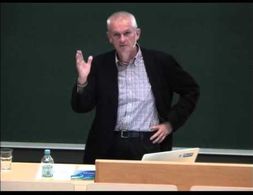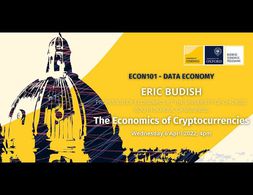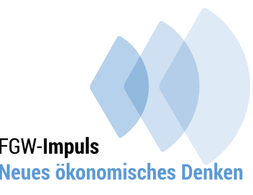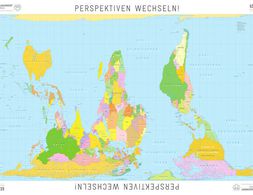33 Ergebnisse
The Microeconomics of Complex Economies uses game theory, modeling approaches, formal techniques, and computer simulations to teach useful, accessible approaches to real modern economies.
In this lecture Mirowski claims that a good critique of and alternative to neoclassical economics should focus on microeconomics. In addition, he claims that mainstream economics is not about a specific "human nature", instead the understanding of markets (partially based on Hayek) is of special importance. As an alternative Mirowski proposes institutionalist economics that builds upon how markets work nowadays (e.g. links to computer science).
Walter Ötsch beschreibt wie die Ökonomik sich von der Moralwissenschaft unter Adam Smith zu einer Wissenschaft mit einem biologisch determinierten Menschenbild unter Malthus und Ricardo entwickelt. In diesem Prozess kommen naturwissenschaftliche Metaphern (Uhr-System, Waage-Gleichgewicht, Computer-Information) immer mehr zum Tragen. Anhand der Geschichte wird die Entwicklung der modernen Neoklassik gezeigt. Dann wird die marktliberale Interpretation der Neoklassik kritisiert. Zum Schluss wird noch auf das fehlende Narrativ der Ökonomik zur Finanzkrise eingegangen und auf den nicht stattgefundenen Bruch mit der Marktradikalität der Eliten.
This text provides an easy to understand introduction to complexity economics for non-specialist audiences such as bachelor's students.
Post-Keynesians focus on the analysis of capitalist economies, perceived as highly productive, but unstable and conflictive systems. Economic activity is determined by effective demand, which is typically insufficient to generate full employment and full utilisation of capacity.
Diese Webseite widmet sich der Vielfalt bestehender ökonomischer Theorien und Methoden. Orientiere Dich, vergleiche, entdecke und studiere die unterschiedlichen ökonomischen Perspektiven.
This article explores if power dynamics in the household can be changed, and if so, how. In this context the focus is laid on government childcare policy and its various channels of possible influence.
An essay of the writing workshop on Nigeria’s Readiness for and the Effect of the Fourth Industrial Revolution
This paper starts with an evaluation of three common arguments against pluralism in economics: (1) the claim that economics is already pluralist, (2) the argument that if there was the need for greater plurality, it would emerge on its own, and (3) the assertion that pluralism means ‘anything goes’ and is thus unscientific. Pluralist responses to all three arguments are summarized. The third argument is identified to relate to a greater challenge for pluralism: an epistemological trade-off between diversity and consensus that suggests moving from a discussion about ‘pros’ and ‘cons’ towards a discussion about the adequate degree of plurality. We instantiate the trade-off by showing how it originates from two main challenges: the need to derive adequate quality criteria for a pluralist economics, and the necessity to propose strategies that ensure the communication across different research programs. The paper concludes with some strategies to meet these challenges.
The lecturer focuses on his own paper The Economic Limits of Bitcoin and Anonymous Decentralized Trust on the Blockchain analysing the innovation of cryptocurrencies particularly bitcoin and its economic credibility The innovator of cryptocurrency Satoshi Nakamoto incorporated an interesting combination of computer sciences and economics The paper argues the limitations …
The Covid-19 pandemic has laid bare the deep structural rifts in modern capitalist economies. It has exposed and exacerbated the long-lasting systemic inequalities in income, wealth, healthcare, housing, and other aspects of economic success across a variety of dimensions including class, gender, race, regions, and nations. This workshop explores the causes of economic inequality in contemporary capitalist economies and its consequences for the economy and society in the post-pandemic reality, as well as what steps can be taken to alleviate economic inequality in the future. Drawing from a variety of theoretical and interdisciplinary insights, the workshop encourages you to reflect on your personal experiences of inequality and aims to challenge the way in which the issue is typically approached in economics.
Marxian Political Economy focuses on the exploitation of labour by capital. The economy is not conceived as consisting of neutral transactions for exchange and cooperation, but instead as having developed historically out of asymmetric distributions of power, ideology and social conflicts.
The goal of the class is to acquire familiarity with recently-published research in alternative macroeconomics with a focus on the distribution of income and wealth, cyclical growth models, and technical change.
Geographical economics starts from the observation that economic activity is clearly not randomly distributed across space. This revised and updated introduction to geographical economics uses the modern tools of economic theory to explain the who, why and where of the location of economic activity. The text provides an integrated, first-principles introduction to geographical economics for advanced undergraduate students and first-year graduate students, and has been thoroughly revised and updated to reflect important developments in the field, including new chapters on alternative core models and policy implications.
The Philosophy of Economics Foundational Text provides a systematic and well-structured overview over the field of philosophy of economics.
Mainstream inflation theories in economics do little to explain the recent acceleration in price increases. The associated economic policy recommendations further increase the misery of low-income groups.
An introductory course on Game Theory
Der Fokus des Postkeynesianismus liegt auf der Analyse kapitalistischer Ökonomien. Diese werden als sehr produktive, jedoch instabile und konfliktive Systeme angesehen. Wirtschaftliche Aktivität wird von der effektiven Nachfrage bestimmt, die in der Regel keine Vollbeschäftigung und Vollauslastung der Kapazitäten garantieren kann.
Hohepriester der Freihandelssekte Internationaler Handel und Globalisierung in Standardlehrbüchern der Volkswirtschaftslehre Achim Truger Quelle van Treeck Till and Janina Urban Wirtschaft neu denken Blinde Flecken in der Lehrbuchökonomie iRights Media 2016 Das Buch kann hier bestellt werden http irights media de publikationen wirtschaft neu denken Rezensierte Bücher Krugman P R …
The usual background and distinctions between complexity and neoclassical economics are presented Neoclassical economics deals with perfectly rational representative agents this creates states of equilibrium On the other hand complexity economics relaxes these assumptions to deal with responsive agents in an uncertain dynamic environment this creates states of disequilibrium More …
Thinking in Systems, is a concise and crucial book offering insight for problem solving on scales ranging from the personal to the global. Edited by the Sustainability Institute's Diana Wright, this essential primer brings systems thinking out of the realm of computers and equations and into the tangible world, showing readers how to develop the systems-thinking skills that thought leaders across the globe consider critical for 21st-century life.
Wie einseitig ist die Wirtschaftswissenschaft? Studienreihe der Universität Siegen.
Mainstream-Wirtschaftstheorie beherrscht den wirtschaftspolitischen Diskurs sowie die wissenschaftliche und Lehrbuch-Literatur.
One method of economic modelling that has become increasingly popular in academia, government and the private sector is Agent Based Models, or ABM. These simulate the actions and interactions of thousands or even millions of people to try to understand the economy – for this reason ABM was once described to me as being “like Sim City without the graphics”. One advantage of ABM is that it is flexible, since you can choose how many agents there are (an agent just means some kind of 'economic decision maker' like a firm, consumer, worker or government); how they behave (do they use complicated or simple rules to make decisions?); as well as the environment they act in, then just run the simulation and see what happens as they interact over time.
An essay of the writing workshop on Nigeria’s Readiness for and the Effect of the Fourth Industrial Revolution
Die ökonomische Theorie hat mit Moral wenig oder gar nichts zu tun. In den gängigen Lehrbüchern der Mikroökonomie findet sich in den Stichwortverzeichnissen kein Eintrag zu Moral oder Ethik. Die Studierenden lernen über die Wirtschaft nachzudenken, aber sie lernen dabei nicht, systematisch über ethische Fragen zu reflektieren. Nach der neoklassischen Lehre, wie sie in den Lehrbüchern präsentiert wird, weist wirtschaftliches Handeln nicht grundsätzlich moralische Aspekte auf.
Oft werden Universitäten mit neutraler Wissenschaft verbunden und das von Dozierenden vermittelte Wissen als Abbildung der Realität wahrgenommen. Nur selten ist es Gegenstand kritischer Auseinandersetzungen. Wissenschaft findet jedoch in keinem neutralen Raum statt, sondern ist von Machtstrukturen und somit auch oft von diskriminierenden Denkweisen geprägt. Genau hier setzt unser Projekt an, mit dem wir einen Beitrag zur kritischen, interdisziplinären Auseinandersetzung mit Rassifizierung und Diskriminierung an der Universität Bayreuth und darüber hinaus leisten wollen. Unser Interesse am Thema Rassifizierung im Kontext universitärer Lehre und Forschung entstammt dabei der kritischen Auseinandersetzung mit den Lehrinhalten der Vorlesung „Ökonomik der Entwicklungsländer“ von Prof. Dr. Martin Leschke sowie mit dem begleitenden Lehrbuch „Ökonomik der Entwicklung – Eine Einführung aus institutionenökonomischer Sicht“. Als uns Themen und Begriffe auffielen, die unserer Einschätzung nach in ihrer Verwendung nicht dem aktuellen Umgang mit postkolonialen Machtverhältnissen und Eurozentrismus entsprachen, kam uns die Idee, eine kritische Begleitschrift zu besagtem Lehrbuch zu verfassen.
Der Fokus der Marxistischen Politischen Ökonomik liegt auf der Ausbeutung von Arbeit durch Kapital. Die Ökonomie wird nicht als neutrale Austausch- und Kooperationsplattform gesehen, sondern als historische und politische Ausprägung, die von asymmetrischen Machtverhältnissen, Ideologie und sozialen Konflikten geprägt ist.
Der Fokus der Institutionenökonomik liegt auf der Rolle von sozialen Institutionen, wie Verträgen, Gesetzen oder auch Verhaltensweisen, in der Produktion, der Verteilung und dem Konsum sowie auf den aus ihnen resultierenden sozialen Beziehungen.
Innovationspolitik ist relevant für eine klimabewusstere Zukunft – und ihre Relevanz geht über die generelle Förderung allgemein umweltbewusster Innovationen hinaus.
Leigh Phillips and Michal Rozworski examine the apparent contradiction between the demise of real-existing socialism and the rise of large corporations engaging in planning every day, making a strong argument that these planning efforts should be transformed to now fulfil the needs of the people.
"Specialise!" is the advice often given by career advisers, school teachers and the like. David Epstein takes the opposite position: In an ever more specialised, highly complex world, it pays to have good old-fashioned broad common knowledge in as many areas as you take interest in, both in terms of intellectual curiosity and professional success. To have a decent grasp of various aspects of life means to be able to discern the links between them, thus developing a better understanding of how our world works and what drives events as they unfold.
Wir nutzen Cookies. Klicke auf "Akzeptieren" um uns dabei zu helfen, Exploring Economics immer besser zu machen!































